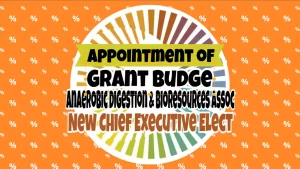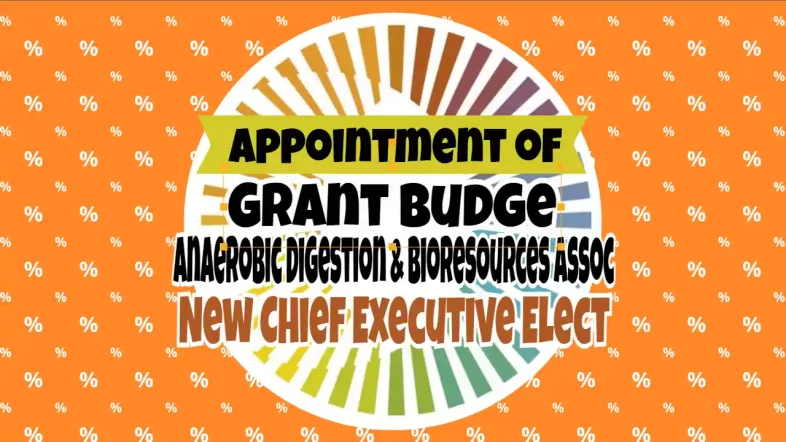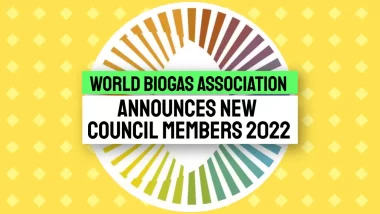Press release 18 January 2022:
UK anaerobic digestion trade association appoints Chief Executive Elect
Grant Budge joins the Anaerobic Digestion and Bioresources Association as successor to Charlotte Morton

The Anaerobic Digestion and Bioresources Association (ADBA) has announced the appointment of Grant Budge as Chief Executive Elect, to succeed Charlotte Morton, who will gradually withdraw from her ADBA Chief Executive role to focus on her position as head of the World Biogas Association (WBA).
Holder of an MEng (Hons) from Imperial College London, an MBA from Leeds University and a Masters in Renewable Solutions from the European Centre of Technology, Grant previously worked as Managing Director of Catalyst Consulting, a firm providing services to clients across clean/low emissions heat and power, mining and industrial technologies, asset management and operational improvement.
Grant is a Chartered Engineer and Fellow of the Institute of Materials, Minerals and Mining and a member of the UK Science Council. During his career, he has been Vice-Chairperson of the EU CCS network, has worked on Zero Emissions Platform working parties and was a member of the foundation industries (steel, glass, chemicals and ceramics) development team for the Industrial Strategy Challenge Fund. He is a peer reviewer for UK Research and Innovation (part of the UK government Department of Business, Energy and Industrial Strategy).
 Commenting on the appointment, current Chief Executive Charlotte Morton said:
Commenting on the appointment, current Chief Executive Charlotte Morton said:
“We’re delighted to welcome Grant to lead the ADBA team while I transfer my attention fully to WBA as its Chief Executive. I have no doubt that with his extensive engineering background, experience and keenness to make a difference, Grant will be able to successfully support the UK anaerobic digestion and biogas industry to reach its full potential by the end of the decade.”
“I am excited to be joining ADBA and begin work with the team”
Grant Budge commented.
“I believe the Association has a unique role representing an industry supply chain in the UK that can add so much value to the global effort to mitigate the impact of climate change. I am keen to build on the foundations that Charlotte and the team have been putting in place to demonstrate and enable this value to be realised.”
Charlotte’s ambition at the helm of WBA is to help facilitate the deployment of the sector globally and to ensure it contributes fully to achieving the world’s net-zero targets.
– PR ENDS –
The Anaerobic Digestion and Bioresources Association (ADBA) is a trade association representing the anaerobic digestion (AD) and biogas industries in the United Kingdom (UK).
In order to assist the UK in meeting its emissions targets and other policy objectives, ADBA's vision is for the entire potential of the AD industry to be realised by 2030, resulting in the creation of an environmentally friendly, completely circular economy. adbioresources.org
About the Anaerobic Digestion Industry
In the United Kingdom, there are now 686 AD plants in operation.
Every year, the entire industry digests roughly 46 million tonnes of organic material – organic material that would otherwise generate greenhouse gases if it were disposed of in a landfill without being treated.
An estimated 16.6 TWh of biogas is produced each year by the AD industry – this green gas is either utilised to generate electricity and heat via a combined heat and power (CHP) unit or upgraded to biomethane and put straight into the national gas grid. This is enough to heat 1.3 million houses in the United Kingdom.
Every year, the industry contributes to a 1% reduction in greenhouse gas emissions in the United Kingdom.
In the United Kingdom, an estimated 4,800 persons are currently employed in the AD and biogas industries.
By 2030, it is projected that the UK AD and biogas industry will have created 30,000 direct and 30,000 indirect employment and saved the UK 27 million metric tonnes of CO2 equivalent, which is the equivalent of taking one-third of all automobiles off the road.
The 8 billion m3 of biomethane produced could heat 4.5-6.4 million houses in the United Kingdom.
Which Gas is Produced from Landfill Waste: The Gas that Trash Produces…
Discover which gas is produced from landfill waste and understand its environmental impact and potential energy use. Explore landfill gas management.
Integration of Biogas Systems into the Energy System
Key Takeaways Biogas systems can significantly reduce reliance on fossil fuels by providing a renewable energy source. They play a crucial role in mitigating greenhouse gas emissions, helping combat climate change. Biogas systems offer scalable energy solutions tailored to local needs, particularly in rural areas. Integrating biogas into existing energy grids can enhance grid stability […]
How Much Does Net Zero Cost? The Estimates of Net Zero Expenses in 2024
Hey there! If you're wondering about the price tag of saving our planet, you're not alone. The question “how much does net zero cost?” has been keeping economists, politicians, and business leaders up at night. But here's some good news right off the bat: reaching net zero might be way cheaper than we originally thought! […]







